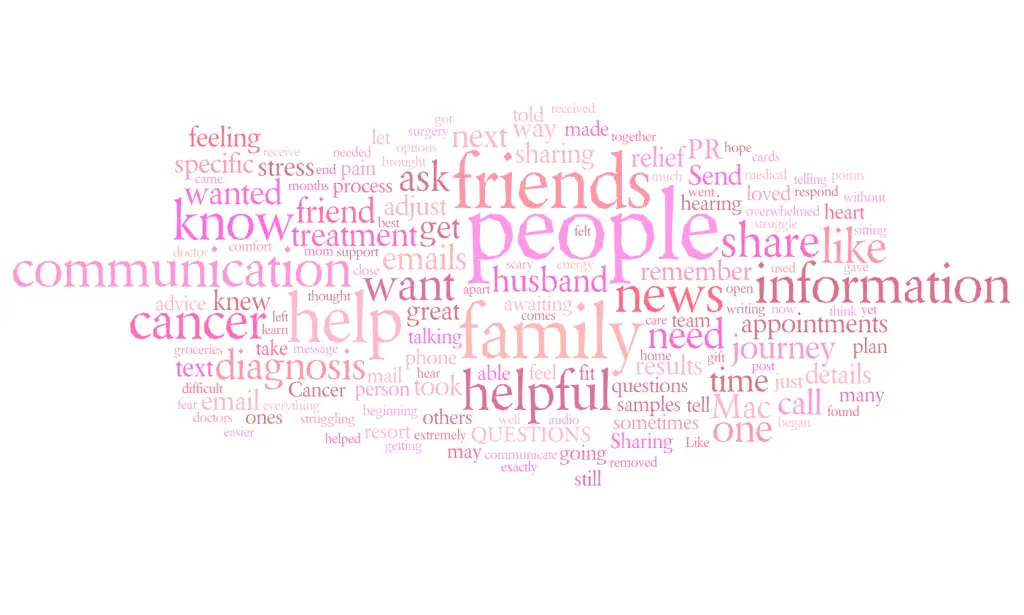I had missed the call three times. Just as we were sitting down to lunch, the phone rang again. I stepped outside of the busy resort cafeteria to take the call. I heard her say, “The results aren’t what you want to hear.” In that moment I knew it was cancer even before she uttered the words. I tried to ask her for more information but she didn’t have much to say. “Still waiting on test results…. receptors will tell us more… you’ll meet with a comprehensive team when you get back”. I only took in bits and pieces. After getting off the phone with the doctor and reeling from the news, my next thought was how on earth do I pick up the phone and tell my husband I have cancer. He was at home in NC awaiting the results of the biopsy just like I was. We both knew we could receive life changing news this week or the ultimate relief. I didn’t think or prepare, I just dialed and fell apart.
Though I was devastated, we focused on the details; what do we know and what comes next. I can barely remember what was said, but I do remember that I was sitting on a bench at our resort in Mexico with tears pouring down my face. The guests around me were a blur of water splashing and flip flops slapping on the pavement. It’s like those puzzler pictures where they ask you to find which item doesn’t fit with the others. I was the one that didn’t fit. How could I be here at this beautiful resort in my bathing suit learning I had a cancerous tumor in my breast. I do remember my husband on the other end of the line reassuring me that we would get through this together. The next person I called was my mom. Like my husband, my parents had been awaiting the news. I could hear my mom’s heart breaking for me when I told her the news. I think the most pain for my parents and husband came from being so far away from me and feeling unable to support or help me in anyway. Being out of the country when I received the news shaped the way I would communicate with my friends and family about my cancer.
Throughout the next couple days as I began to adjust to the news, talking about my diagnosis made it feel real. When I was left to my thoughts, fear took over. I felt as if I was walking around with a big secret, living a lie on the outside. Sharing my scary news with my friends and family brought me solace and comfort. I no longer felt alone in my fear.
I told most of my close friends by text. Many of them had been awaiting the results with me and the news though surprising, did not come out of left field. For every friend I told, I felt I had one more player on my team. Texting and emailing with friends and family that week got me through the hardest time.
I wanted to share all of this as a preface to explain what role communication has played for me in my journey. Some people do not want to share their journey and I fully respect that decision. Sharing with others has brought me great comfort and relief and thus I have chosen to be very open about my struggle and my growth throughout this journey. This post will be most helpful for the people like me who do want to share their journey with their loved ones. I am going to share the process that Mac and I used to communicate with our friends and family, what we call our “Cancer Press Release” or “Cancer PR”. It worked so well and we received such positive feedback from our loved ones, we thought it was worth sharing. Keep in mind that you can adjust these suggestions and samples to fit the level of information you feel comfortable sharing.
After the initial release of telling everyone I had cancer, the stressful communication began. QUESTIONS, QUESTIONS, QUESTIONS, most of which we did not have answers to yet. Everyone had the same questions, which required us to repeat the same information over and over again. The more questions people asked, the more overwhelmed I felt. Everyone wanted to know how I was, the details of my prognosis, what my treatment options were and the reasons behind my treatment decisions. We wanted to take control of the communication and remove the stress it was causing for us.
Mac and I decided to approach our information sharing like a PR statement. Instead of responding to each text, or email or call, we created our PR Statements and sent them to one group of people on an email chain. We then let our point people (our moms) know who that information could be shared with. Our PR emails usually went out after big appointments when we had the most information. I found it to be therapeutic writing the emails. Writing the emails was a way for Mac and I to process everything we learned and summarize the important points. Mac used Microsoft OneNote in all of our meetings. This software allowed us to take notes and record audio. He was then able to link the text to specific points in the audio so we could reference and review the information later. This was a very helpful resource as it was very difficult to remember everything that was said in my appointments.
When it came time to write our first email we let the following questions guide our writing:
- What questions will people ask?
- What stage is your cancer?
- What is your treatment plan?
- What is your official diagnosis?
- What are your options?
- What will your symptoms be?
- Will you have surgery?
- Have you gotten a second opinion?
- Are there clinical trials you can be apart of?
- What information do we want to share?
- My diagnosis
- My treatment plan
- Timeline
- Additional testing
- How I am feeling
- What comes next
- Reputable Resources
- Referring our family and friends to other sources of reputable information took the pressure off of us to explain everything.
- How can people help? What do we need right now? (At the beginning we didn’t know how people could be helpful because our day-to-day lives hadn’t changed yet aside from the million appointments. As my treatment went on, we were able to be more specific.)
- Send texts/emails to say hello (we may not always have energy to respond) this is not the venue to ask what I need, how i’m doing, or expect any type of information reply. This is just meant to be a quick positive message…
- Snail mail is great – who doesn’t love getting pretty inspirational cards in the mail.
- Give me a hug
- Ask how my heart feels – sometimes this one is overlooked when the focus is on the physical pain (rather than the general statement “how are you doing”)
- Bring a meal
- Send a care package
- Offer to clean our home
- Share about yourself. As much as I like talking about what’s going on with us, sometimes I want a break and I miss hearing about you. Don’t worry, it’s not insensitive and I like hearing about your problems.
- What is NOT helpful?
- Sharing unsolicited medical advice – I have a team of amazing doctors giving me plenty of reputable advice. If I want additional resources or medical advice, I will ask.
- Treating me like an invalid – when I need help I will ask and I will be specific about what I need. I have to learn my limits and learn my pain as I adjust it will be clearer what areas I need more assistance in.
After we determined what information we wanted to share and compared that to what we knew people would ask we drafted the emails with kindness and lots of facts. Since I was open to sharing my journey, there were only a few personal details about our fertility issues and the IVF process that we chose not to share with everyone. The response from our family and friends was one of relief and gratitude. They were so relieved to know what was going on with me and they were grateful to know exactly how to be helpful.
Since it may be difficult to get a sense for what these letters look like without reading one, I have attached two samples with some of the details of my diagnosis/treatment removed. I hope these will be helpful to other people struggling with how to tell their family and friends about their diagnosis and maintain communication with so many people in an ongoing manner.
Mac and I found that by making it very clear to family and friends how they could help, we got exactly what we needed and wanted. It made it easier for others to give and easier for us to receive. It also took the pressure off of us to keep telling people what we needed or how they could help.
Cancer is such a scary thing and many people don’t know what to say or what to do, the patient included. I hope this post and the sample emails will serve as a road map for communication. Feel free to adjust the guidelines or samples along the way as you find out what works best for you and your situation. I cannot stress enough how helpful it was to me to have a plan for communication. It removed the stress from the communication and helped me better connect with my loved ones. Staying in communication has helped me feel more support and less alone in my struggle.
This article on Huffington Post:44 Ways to Make the Day of Someone With Cancer has some great ideas for how to help a friend with cancer. Here are a few of my favorites from their list. Check out the full article for more ideas.
- Deliver a meal. One of our friends set up a Meal Train and this was the best gift ever! It ran for 2 months, from my surgery through the beginning of chemo. Not having to stress about groceries, cooking or clean up during this challenging time was a huge weight off our shoulders. It also gave our friends and family a specific way to help. We had a cooler on our porch with an adorable sign my friend made so we can let people know it I was resting and not up for talking or if I was feeling well and up for socializing. This was also a way for us to socialize individually with people we care about and to say thank you. For out of town friends and family, we gave some suggestions of restaurants we frequent and they were able to send gift cards in the mail. Those have been extremely helpful now during the chemo time. Juggling work and doctors appointments can be tough and sometimes we still don’t have the energy to cook or we don’t get to the store for groceries. Knowing we have an easy dinner option is such a relief.
- Remember to still be there a few months after the diagnosis, when it’s not so new anymore. The fanfare will have died down, but your friend will still be struggling and needing logistical and emotional help.


11 Comments